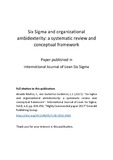Mostrar el registro sencillo del ítem
Six Sigma and organisational ambidexterity: a systematic review and conceptual framework
| dc.creator | Alcaide Muñoz, Cristina | es_ES |
| dc.creator | Gutiérrez Gutiérrez, Leopoldo J. | es_ES |
| dc.date.accessioned | 2020-10-14T10:56:04Z | |
| dc.date.available | 2020-10-14T10:56:04Z | |
| dc.date.issued | 2017 | |
| dc.identifier.issn | 2040-4166 | |
| dc.identifier.uri | https://hdl.handle.net/2454/38394 | |
| dc.description.abstract | Purpose – The aim of this paper is to analyse the relationship between Six Sigma methodology and organisational ambidexterity (exploitation and exploration orientations). For this purpose, this study describes how Six Sigma practices may enhance both orientations simultaneously, contributing to organisational ambidexterity and performance improvements. Design/methodology/approach – A systematic literature review was adopted as the research methodology. The authors analysed 512 publications in Social Science Citation Index journals in fields such as management, business, operation research management science, planning development, behavioural sciences, interdisciplinary social sciences and applied psychology from 1987 to 2016, as the first development and adoption of Six Sigma was in 1987 by Motorola. Findings – This analysis describes how Six Sigma emphasises not only useful practices for exploitation orientation, such as customer input, design for manufacturability or improvement and control of processes, but also explorative practices, such as discovery, novelty or innovation. Consequently, an adequate combination of all these practices may enhance organisational ambidexterity and organisational success. Research limitations/implications – This study relies exclusively on previously published literature that fulfilled the selection criteria described in the search methodology. Further empirical research is necessary to test the propositions included in this paper. Practical implications – This study has important implications for academics, practitioners and employers, as it furnishes new theoretical insights to the scarce literature that studies the relationship between quality management practices and organisational ambidexterity. The authors provide a better understanding of Six Sigma philosophy and some fresh and new insight on how Six Sigma practices may help organisation develop distinctive competitive competences by its influence over exploration and exploitation orientations (ambidexterity). Therefore, it might be of interest to those practitioners interested in achieving a successful competitive position and discover emerging business opportunities, as it may provide some guidance on the important implication of Six Sigma practices over exploration and exploitation orientations. Originality/value – This study provides new insights into the non-existent literature about Six Sigma and organisational ambidexterity and to the scarce literature about quality management and ambidexterity. Propositions on how Six Sigma practices benefit organisational ambidexterity are also suggested. | en |
| dc.format.extent | 32 p. | |
| dc.format.mimetype | application/pdf | en |
| dc.language.iso | eng | en |
| dc.publisher | Emerald | en |
| dc.relation.ispartof | International Journal of Lean Six Sigma, 2017, 8(4), 436-456 | en |
| dc.rights | © 2017, Emerald Publishing Limited | en |
| dc.subject | Six Sigma | en |
| dc.subject | Quality management | en |
| dc.subject | Ambidextrous organization | en |
| dc.subject | Exploitation orientation | en |
| dc.subject | Exploration orientation | en |
| dc.title | Six Sigma and organisational ambidexterity: a systematic review and conceptual framework | en |
| dc.type | info:eu-repo/semantics/article | en |
| dc.type | Artículo / Artikulua | es |
| dc.contributor.department | Gestión de Empresas | es_ES |
| dc.contributor.department | Enpresen Kudeaketa | eu |
| dc.rights.accessRights | info:eu-repo/semantics/openAccess | en |
| dc.rights.accessRights | Acceso abierto / Sarbide irekia | es |
| dc.identifier.doi | 10.1108/IJLSS-08-2016-0040 | |
| dc.relation.publisherversion | https://doi.org/10.1108/IJLSS-08-2016-0040 | |
| dc.type.version | info:eu-repo/semantics/acceptedVersion | en |
| dc.type.version | Versión aceptada / Onetsi den bertsioa | es |


